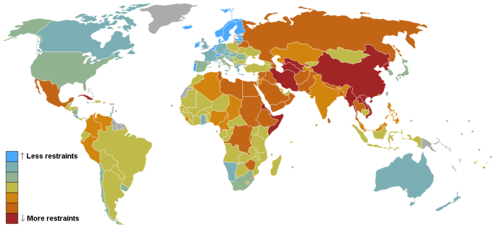# 2334
Yesterday's `technical error' by Xinhua news - where they published the details of a space launch hours before it happened- would have been more amusing had it not occurred at the same time as another, more serious, media manipulation.
China space mission article hits Web before launch
Thu Sep 25, 9:20 AM ET
BEIJING - A news story describing a successful launch of China's long-awaited space mission and including detailed dialogue between astronauts launched on the Internet Thursday, hours before the rocket had even left the ground.
The country's official news agency Xinhua posted the article on its Web site Thursday, and remained there for much of the day before it was taken down.
A staffer from the Xinhuanet.com Web site who answered the phone Thursday said the posting of the article was a "technical error" by a technician. The staffer refused to give his name as is common among Chinese officials.
The Shenzhou 7 mission, which will feature China's first-ever spacewalk, is set to launch Thursday from Jiuquan in northwestern China between 9:07 a.m. EDT and 10:27 p.m. EDT.
The arcticle, dated two days from now on Sept. 27, vividly described the rocket in flight, complete with a sharply detailed dialogue between the three astronauts.
Absurd? Yes, in the extreme.
And so cliché as to evoke a bit of a smile.
After all, this is propaganda so blatant, so unapologetic, so unabashedly bold as to be worthy of some sort of award.
Unfortunately, this is also indicative of just how reliable the news is coming out of China.
Today we are now learning just how widespread the tainted milk scandal in China really is, and along with it, charges of government cover ups.
Chinese officials ordered cover-up of tainted milk
- Richard Spencer, Beijing
- September 26, 2008

A baby whose urine has just been tested for kidney stones waits with his mother in a hospital in Taipei. PICTURE: REUTERS Photo: Reuters
CHINESE authorities ordered a cover-up of a tainted milk scandal that has poisoned tens of thousands of babies because they feared social unrest if the news was made public.
Senior officials gave the order to Sanlu, the company whose poisoned milk powder is said to be responsible for at least four deaths and illnesses in almost 53,000 infants.
<snip>
The central Government had issued orders to suppress "bad news" during the period of the Olympic Games, which were starting that week. The authorities were also concerned about the effect on "social stability" - a euphemism for public protest - according to a source briefed by those present.
The details of the meetings are the first confirmation that the cover-up was deliberate policy and not bureaucratic inertia.
This goes beyond the absurd. This is tragic. Or as the WHO (World Health Organization) has called it: Deplorable.
For the want of `keeping the lid on things', thousands of babies have been poisoned, and appropriate medical care has been delayed.
Of course, we've seen this sort of thing before.
In 2003 Chinese officials covered up the existence of a new, infectious, and highly fatal virus called SARS. Their denials allowed thousands to become infected, and for the virus to escape the confines of China and make it to dozens of countries around the world.
We've been assured that such cover ups wouldn't happen again. That China learned their `lesson'.
Apparently not.
Hardly a comforting thought in a world where early notification of an outbreak of a novel influenza virus could mean the difference between life and death for thousands of people.
The general lack of bird flu news over the summer has been slightly encouraging. China hasn't reported a human infection with the H5N1 virus since last February.
But of course, to be really heartened, you'd have to believe that no news really is good news.
And not just the result of a tightly controlled press.
China consistently ranks near the bottom of countries ranked by the freedom of their press by Reporters Without Borders. Here are the bottom 10 countries on this year's list.
158 Iran
159 Saudi Arabia
160 Nepal
161 Vietnam
162 China
163 Eritrea
164 Turkmenistan
165 Burma
166 Cuba
167 North Korea
Many of the bird flu hot-zone countries fall into the more-restrictive press freedoms category.

RWB compiles and publishes an annual ranking of countries based upon the organization's assessment of their press freedom records
Related Post:
Widget by [ Iptek-4u ]